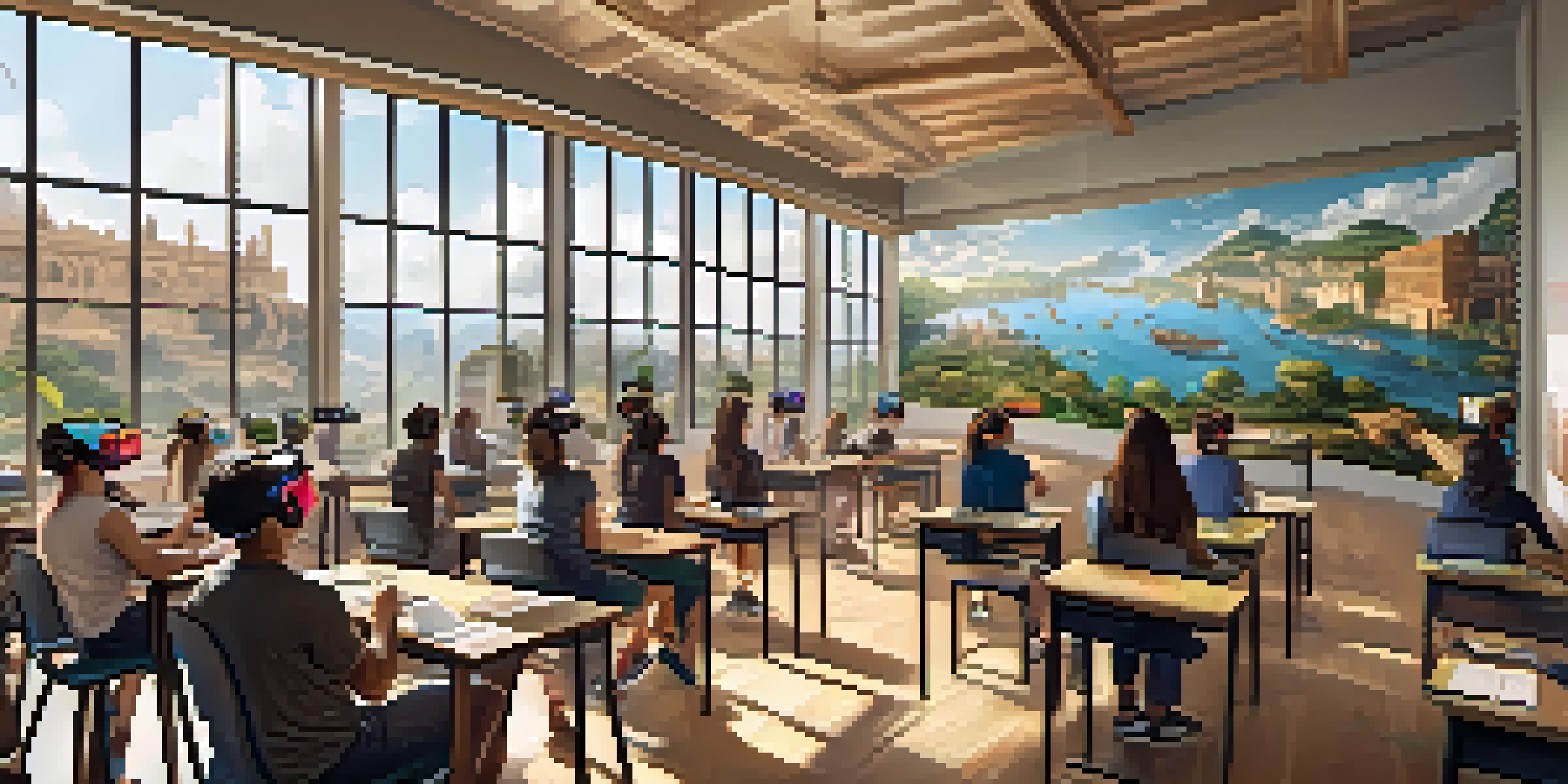Transformative Research Innovations in Education at MSU

Overview of Educational Innovations at MSU
Michigan State University (MSU) is at the forefront of transforming education through innovative research. This initiative focuses on enhancing learning experiences and outcomes for students across various disciplines. By integrating cutting-edge technology and pedagogical strategies, MSU aims to create a dynamic educational environment that adapts to the needs of modern learners.
Education is the most powerful weapon which you can use to change the world.
The university’s commitment to research-driven approaches underscores the importance of evidence-based practices in education. MSU’s scholars collaborate across fields, merging insights from psychology, technology, and pedagogy to develop effective teaching methods. This interdisciplinary focus not only enriches the educational landscape but also ensures that students are well-prepared for the challenges of the future.
Through its innovative programs, MSU is reshaping the way knowledge is delivered and absorbed. By prioritizing student engagement and active learning, the university is setting a benchmark for educational institutions nationwide. This commitment to transformation highlights MSU’s role as a leader in educational innovation.
Leveraging Technology in Learning Environments
Technology is a key player in MSU's educational innovations, providing tools that enhance both teaching and learning. Interactive platforms, virtual simulations, and adaptive learning systems are just a few examples of how technology is integrated into the classroom. These tools not only foster engagement but also allow for personalized learning experiences that cater to individual student needs.

For instance, the use of virtual reality (VR) in certain courses enables students to immerse themselves in real-world scenarios, making learning more impactful. Imagine donning a VR headset and exploring ancient civilizations or conducting virtual chemistry experiments—this is the kind of experiential learning that MSU promotes. Such technological advancements help bridge the gap between theory and practice, enriching students' understanding.
Innovative Learning at MSU
Michigan State University is transforming education by integrating cutting-edge technology and research-driven pedagogical strategies to enhance student engagement and outcomes.
Moreover, these technological innovations facilitate collaboration among students and instructors, breaking down traditional barriers. By utilizing online discussion forums and collaborative tools, MSU encourages a community of learners who can share ideas and resources. This connectedness not only enhances the learning experience but also prepares students for collaborative work environments.
Research-Based Pedagogical Approaches
At MSU, the integration of research-based pedagogical methods is pivotal to enhancing educational effectiveness. Faculty members are encouraged to adopt evidence-based strategies that have been proven to improve student outcomes. This commitment to research-driven teaching ensures that students receive a high-quality education grounded in the latest findings in educational psychology and learning science.
The future belongs to those who believe in the beauty of their dreams.
For example, the implementation of active learning strategies—such as group discussions and problem-solving activities—has shown significant improvements in student engagement and retention. These methods shift the focus from traditional lectures to more interactive formats, allowing students to take ownership of their learning. By fostering critical thinking and collaboration, MSU prepares students to tackle complex problems in their future careers.
Additionally, ongoing assessments and feedback are integral to this approach. Faculty regularly evaluate the effectiveness of their teaching methods, making adjustments based on student performance and feedback. This continuous improvement mindset not only enhances the learning experience but also cultivates a culture of innovation within the university.
Community Engagement and Collaborative Learning
MSU recognizes the value of community engagement in education, promoting collaborative learning experiences that extend beyond the classroom. By partnering with local organizations, the university creates opportunities for students to apply their knowledge in real-world settings. This hands-on experience not only reinforces classroom learning but also fosters a sense of civic responsibility among students.
For instance, MSU’s service-learning initiatives encourage students to work on community projects that address local needs. Through these projects, students gain insights into social issues while developing valuable skills such as teamwork and leadership. This experiential learning approach is a testament to MSU's commitment to producing well-rounded graduates who are equipped to make meaningful contributions to society.
Community-Centric Education
MSU promotes community engagement through collaborative learning experiences, allowing students to apply their knowledge in real-world settings while fostering civic responsibility.
Moreover, these collaborative efforts enrich the educational experience for both students and community members. By working together, students learn to navigate diverse perspectives and develop empathy—skills that are essential in today’s interconnected world. MSU’s focus on community engagement enhances the relevance of education, ensuring that students are not only learners but also active participants in their communities.
Innovations in Teacher Education Programs
MSU is leading the way in innovating teacher education programs that prepare future educators for the challenges of modern classrooms. The university recognizes that effective teaching goes beyond content mastery; it also requires an understanding of diverse learning needs and the integration of technology. As such, MSU’s programs are designed to equip aspiring teachers with the skills necessary to foster inclusive and engaging learning environments.
One notable aspect of MSU's teacher education is its emphasis on hands-on experiences through partnerships with local schools. Future educators have the opportunity to engage in immersive field experiences, allowing them to apply their theoretical knowledge in real-world settings. This practical approach not only builds confidence but also cultivates a deeper understanding of the complexities of teaching.
Furthermore, MSU actively incorporates feedback from current educators and education researchers to continuously enhance its programs. By staying attuned to the evolving landscape of education, the university ensures that its graduates are well-prepared to meet the needs of diverse learners. This commitment to continuous improvement is a hallmark of MSU’s transformative approach to teacher education.
Impact of Interdisciplinary Research on Education
Interdisciplinary research is a cornerstone of MSU's innovative educational initiatives, allowing for a more holistic approach to learning. By bringing together experts from various fields, the university fosters a collaborative environment that encourages the exploration of complex educational challenges. This synergy leads to the development of innovative solutions that address the multifaceted nature of education.
For example, research exploring the intersection of technology and pedagogy has resulted in groundbreaking tools and strategies that enhance student learning. By analyzing how different disciplines can inform educational practices, MSU is able to create a more robust and adaptable educational framework. This interdisciplinary focus not only enriches the academic experience but also prepares students for the complexities of the workforce.
Future-Ready Teacher Education
MSU's teacher education programs emphasize hands-on experiences and continuous feedback, preparing future educators to meet the diverse needs of modern classrooms.
Additionally, MSU's commitment to interdisciplinary research leads to the creation of unique programs and initiatives that draw on diverse expertise. These collaborative efforts enable the university to stay ahead of educational trends and challenges, ensuring that its graduates are equipped with the skills necessary for success in an ever-changing world. The impact of this research is felt not only within the university but also in the broader educational community.
Future Directions for Educational Innovations
As MSU continues to lead in educational innovation, the future looks promising for both students and educators. The university is committed to exploring new frontiers in teaching and learning, ensuring that education remains relevant and effective in a rapidly changing world. This forward-thinking approach positions MSU as a trailblazer in higher education, ready to tackle emerging challenges.
One area of focus is the integration of artificial intelligence (AI) in education. By leveraging AI tools, MSU aims to personalize learning experiences, allowing for tailored support that meets individual student needs. This not only enhances engagement but also provides valuable data to inform instructional practices, creating a more effective learning environment.

Moreover, MSU is dedicated to fostering a culture of lifelong learning among its students and faculty. By promoting continuous professional development and encouraging exploration of new ideas, the university ensures that its community remains adaptable and resilient. This commitment to innovation and growth is what will ultimately shape the future of education at MSU and beyond.